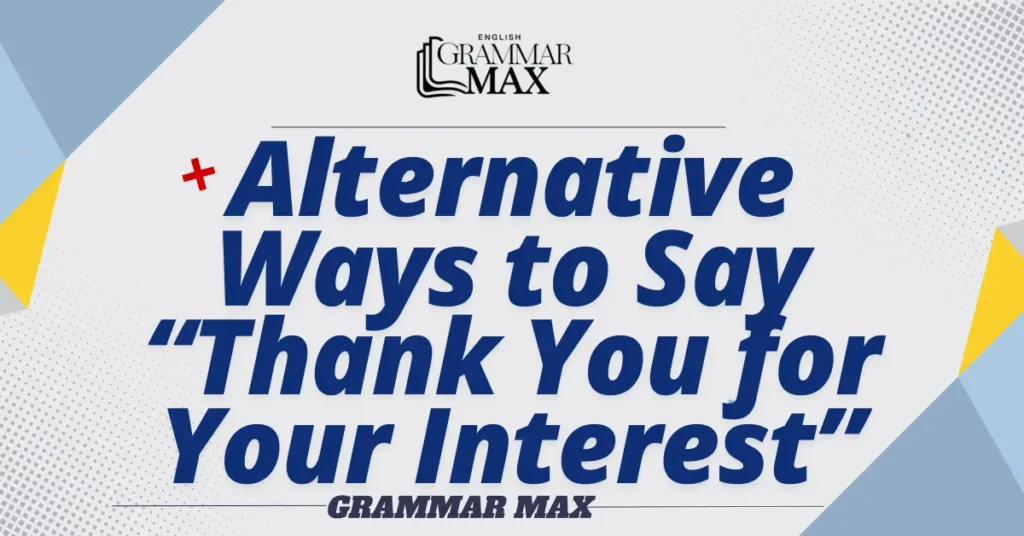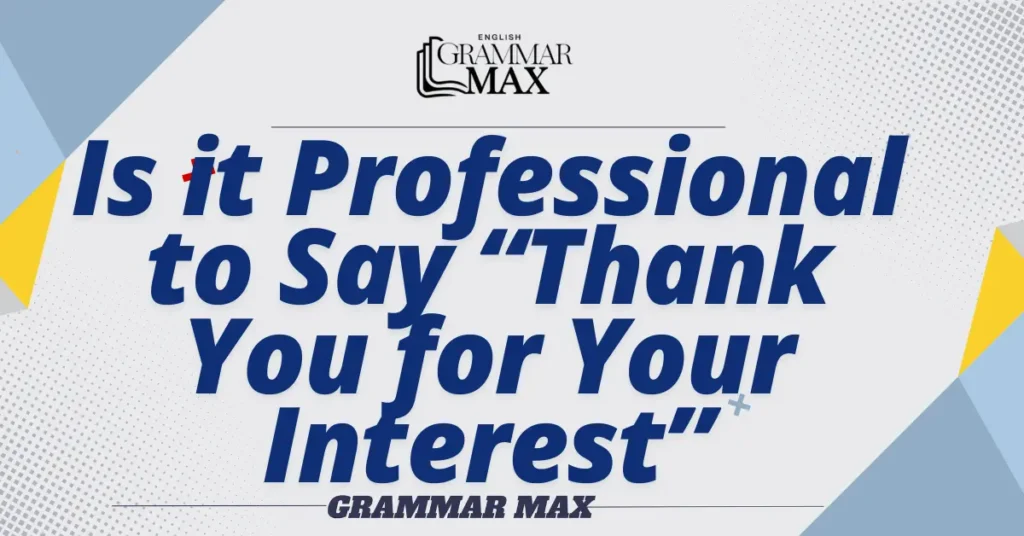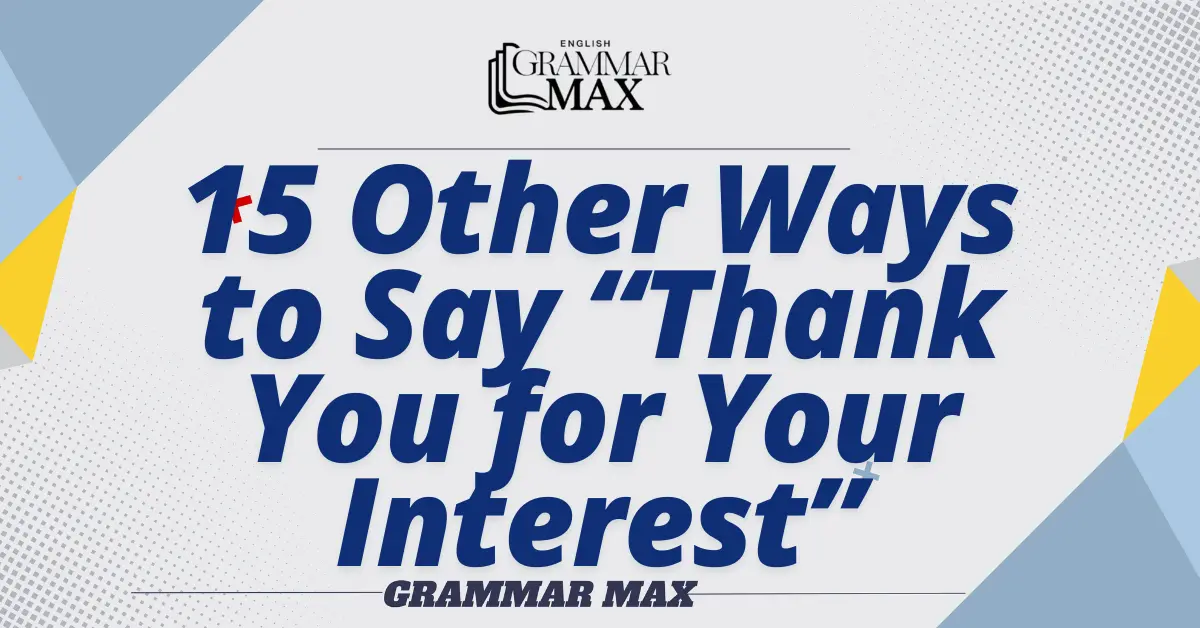Thank You for Your Interest is a common phrase used in professional communication to acknowledge someone’s curiosity, effort, or inquiry. While effective, repeating the same phrase can make your messages sound monotonous and less engaging. Whether responding to job applications, business proposals, or product queries, a variety in wording can elevate your business communication. By learning alternative phrases, you not only express gratitude but also demonstrate professionalism.
In professional contexts, adapting your tone and word choice is vital. Alternative phrases for “Thank You for Your Interest” can help convey a professional tone, show appreciation, and strengthen workplace correspondence. This article explores 15 versatile expressions you can use to craft polite, professional email replies tailored to different scenarios.
Alternative ways to say “Thank you for your interest”

You can use these ways instead to say Thank you for your Interest:
- We Appreciate Your Enthusiasm
- Grateful for Your Inquiry
- Thank You for Reaching Out
- We Value Your Interest
- Appreciate Your Attention
- Thankful for Your Support
- Your Interest Means a Lot to Us
- Acknowledging Your Request
- Your Inquiry Is Highly Appreciated
- Thanks for Considering Us
- Grateful for Your Thoughtfulness
- We Truly Value Your Feedback
- Appreciating Your Insight
- Thanks for Your Time and Interest
- We’re Honored by Your Consideration
We Appreciate Your Enthusiasm
This phrase reflects a professional expression of acknowledgment while highlighting the recipient’s genuine interest. It’s an effective way to convey gratitude and maintain a polite tone in business communication. By showing enthusiasm for their efforts, you establish a positive rapport, especially in workplace correspondence.
Incorporating “We Appreciate Your Enthusiasm” into your email response creates a welcoming environment, whether you’re addressing a job application or a product query. This phrase is versatile, showcasing different expressions that convey a courteous language and gratitude for their engagement.
Email Example:
Dear Jane,
We truly appreciate your enthusiasm regarding our recent product launch. Our team is excited about the opportunity to work with you and will follow up shortly with additional details.
Grateful for Your Inquiry
This alternative offers a concise yet formal way to show thankfulness for someone’s effort in reaching out. It’s particularly suitable for addressing a service inquiry, ensuring a professional tone in formal communication. It underscores that their interest is valued and helps set a positive tone for further discussions.
Using “Grateful for Your Inquiry” in a professional email can enhance your business etiquette by showing appreciation for the time taken to connect. Whether you’re responding to an offer proposal or a customer response, this phrase aligns perfectly with professional alternatives for engaging communication.
Email Example:
Dear John,
We are grateful for your inquiry about our software solutions. Please find attached a brochure outlining our services and pricing structure. Let us know if you have further questions.
Thank You for Reaching Out
This phrase is a staple in business writing and conveys a polite and approachable tone. It is ideal for situations where you need to address queries professionally while keeping the language simple yet formal. Whether in LinkedIn messages or initial contact emails, this expression strikes the right balance.
By using “Thank You for Reaching Out,” you offer a warm acknowledgment while demonstrating business communication strategies. It’s particularly useful in first email scenarios, helping you establish connections with sincerity and respect.
Email Example:
Hello Maria,
Thank you for reaching out to discuss potential partnership opportunities. We value your interest and look forward to exploring possibilities further.
We Value Your Interest
This phrase emphasizes the recipient’s significance in the conversation, making it ideal for business partnerships or responding to job applications. It reflects a respectful wording that goes beyond mere acknowledgment, showing a deeper level of gratitude.
Incorporating “We Value Your Interest” in your email reply helps convey a strong appreciation message. It’s a corporate language option that suits formal letters, especially when responding to inquiries that involve business development or client interaction.
Email Example:
Dear Alex,
We value your interest in the Marketing Specialist position at our company. Our HR team will review your application and contact you shortly with updates.
Appreciate Your Attention
This alternative is perfect for situations requiring polite expressions and an acknowledgment of someone’s focus. It’s well-suited for formal communication, such as when replying to product queries or addressing business proposals.
By stating “Appreciate Your Attention,” you show a level of sincere thanks that aligns with workplace communication norms. This phrase is a synonym phrase that adds variety to your communication options, ensuring you maintain a professional tone throughout your correspondence.
Email Example:
Dear Mr. Williams,
We sincerely appreciate your attention to our recent proposal. Your insights are invaluable, and we are eager to move forward with our collaboration.
Thankful for Your Support
This expression conveys a deeper sense of gratitude, making it suitable for collaborative settings or responses to loyal customers. It’s particularly effective in customer service replies where you want to acknowledge ongoing support.
Using “Thankful for Your Support” in your professional email helps build goodwill and fosters stronger connections. It is ideal for business communication involving appreciation messages or when responding politely to gestures of support.
Email Example:
Dear Emma,
We are thankful for your support in promoting our recent campaign. Your efforts are making a significant difference, and we look forward to continuing this journey together.
Your Interest Means a Lot to Us
This phrase adds a personal touch to your email response, making it particularly suitable for client interactions. It’s a formal communication choice that emphasizes how much you value the recipient’s engagement.
By saying “Your Interest Means a Lot to Us,” you effectively use corporate language to convey gratitude. This phrase works well in situations where you need to balance professionalism with warmth, such as in networking emails or first email exchanges.
Email Example:
Dear Chris,
Your interest means a lot to us, and we are thrilled to share more about our upcoming projects. Please let us know if you have specific questions or areas of focus.
Acknowledging Your Request
This formal phrase is a straightforward way to address queries or reply to questions in a professional tone. It is best suited for workplace communication where clarity and brevity are key, such as replying to a service inquiry or offer proposal.
Using “Acknowledging Your Request” demonstrates a professional approach while maintaining a polite tone. It’s an excellent synonym phrase for formal scenarios, ensuring your business writing meets the standards of business etiquette.
Email Example:
Dear Mr. Patel,
Thank you for submitting your proposal. We are acknowledging your request and will provide feedback after our internal review process.
Is it Professional to Say: Thank You for Your Interest?

Yes, it is professional to say “Thank You for Your Interest” in most workplace scenarios. This phrase is a clear and concise way to show gratitude and acknowledgment in formal settings like job applications, customer inquiries, or business proposals.
However, overusing it might make your communication sound repetitive, especially in situations requiring variety and personalization. For enhanced business etiquette, consider alternative expressions to maintain a polite tone while adding diversity to your email responses. Using this phrase appropriately helps establish respectful wording and aligns with professional communication standards in corporate language.
Pros
- Clear and universally accepted in formal communication.
- Conveys appreciation quickly in workplace correspondence.
Cons
- Repetition may seem impersonal or robotic.
- Limited variety can undermine personalized responses.
Frequently Asked Questions
How do you say thank you for your interest?
You can say “Thank You for Your Interest” or use alternatives like “We Appreciate Your Enthusiasm” or “We Value Your Interest” to convey gratitude in a professional tone.
What does thank you for your interest in mean?
It means expressing appreciation for someone’s curiosity or effort in a specific area, such as a job application, product query, or business proposal.
How do you thank someone for showing interest in an email?
Use phrases like “Thank You for Reaching Out” or “We Appreciate Your Inquiry”, and add a polite acknowledgment of their specific interest in your email response.
How do you thank someone for interest in your work?
Say “Thankful for Your Support” or “Your Interest Means a Lot to Us” to show gratitude while highlighting their engagement with your work.
Conclusion
Thank You for Your Interest remains a cornerstone of professional communication, but exploring alternative phrases enriches your messaging style. By incorporating these varied expressions, you can better align with specific contexts, be it networking emails, business proposals, or responding to queries.
Using diverse phrases fosters stronger connections and demonstrates attention to detail in your business communication strategies. Whether you’re addressing job applications, replying to customer service inquiries, or discussing a business partnership, adopting these alternatives can help you maintain a polite tone while ensuring your message resonates. Crafting thoughtful, grateful communication elevates your workplace correspondence to new levels of professionalism.

William Henry is a writer for Grammar Max, a blog that focuses on synonyms and phrases. He loves exploring the quirks of the English language and enjoys helping readers improve their vocabulary. William’s articles are easy to read, fun, and full of useful tips for anyone looking to better understand and use English. Whether you’re a student, a professional, or just someone interested in language, William’s writing on Grammar Max makes learning about words and their meanings simple and enjoyable.
